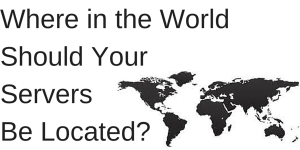When considering server options, any savvy webmaster or systems administrator will take server location into account. There are several ways that this can impact a website. Carefully considering each of the factors discussed in this post can create dramatic improvements in site performance, user experience and even search engine rankings.
What to Consider
First, one must determine whether to use managed or unmanaged colocation services. Colocation, simply put, is the leasing agreement that allots space and infrastructure to enable servers to exist within a datacenter. Unmanaged colocation means that the user is responsible for any hands-on work that must be done to the server, so he/she must be able to perform certain tasks in person. Managed colocation eliminates this need by providing support in the DC.
Next, one must think about the experience that users will have when visiting a site. The closer a site visitor is to a server, the quicker the server’s response will be. This effects page load times and has a very noticeable impact on gaming servers in particular. The bigger the data transfer, the bigger the fluctuation in page load time. Eventually this can create serious lag times or cause server failure. Page load times can also effect how well a site ranks in search engines.
SEO Considerations for Server Location
In addition to the impact that page load time can have on search engine rankings, there is another reason SEO-conscious webmasters should choose datacenter location carefully. “Regional relevance” (as termed by Google) is a ranking factor that determines how relevant a page is by considering the searcher’s location. For example, if someone in Chicago searches for “local traffic laws,” then it doesn’t make sense for a search engine to display results for traffic laws in Shanghai.
Of course, a website using a ccTLD can negate this ranking factor. If a webmaster hosts a site in India but uses the French domain, “.fr”, then the search engine will view the site and its content as being relevant in France – despite being hosted in the India. Of course, search engine algorithms do change frequently. For example, Google has started treating certain ccTLDs as gccTLDs (general country code TLDs) to enable webmasters to register sites using domains like “.me” or “.tv” without sacrificing search engine visibility with their target audience.
Server Reliability
Different datacenters, depending on the quality of management, may provide different levels of server performance. While this does not have anything to do with server location, it is still important to remember. This could be a good case for managed colocation services because if the “guy around the corner” isn’t running a reliable DC, those hosting clients are the ones who lose. Naturally, factors outside the datacenter are also relevant to the decision. A DC in Denver, for instance, is far less likely to be damaged or destroyed by flooding than a DC in another city at a lower elevation. While the example sounds extreme, it is a worthwhile consideration in the process of choosing a server location.
While recognizing that backups are also a huge concern when talking about server reliability, they aren’t necessarily a part of the conversation on server location.
Data Security
One of the most important functions of a server is security. Webmasters must fully understand local and regional legislation regarding data protection when considering the location of a server. For example, Europe has the Data Protection Directive, which basically outlines where and how personal data may be shared. As if guarding proprietary data wasn’t beneficial enough in itself, many governing bodies have made data safety the law.
How to Make the Decision
The most effective way for webmasters and systems administrators to eliminate the chance of any major outage or significant downtime is to diversify their range by spreading workloads across several independent facilities. This solution, though, isn’t a feasible solution for most webmasters. The costs and management simply become overwhelming. More often than not, they choose a location offered by a third-party provider. At SemoWeb, we offer datacenters in both Los Angeles and Orlando – perfect for anyone targeting US traffic. Check out all of our RAID-protected budget VPS plans!


